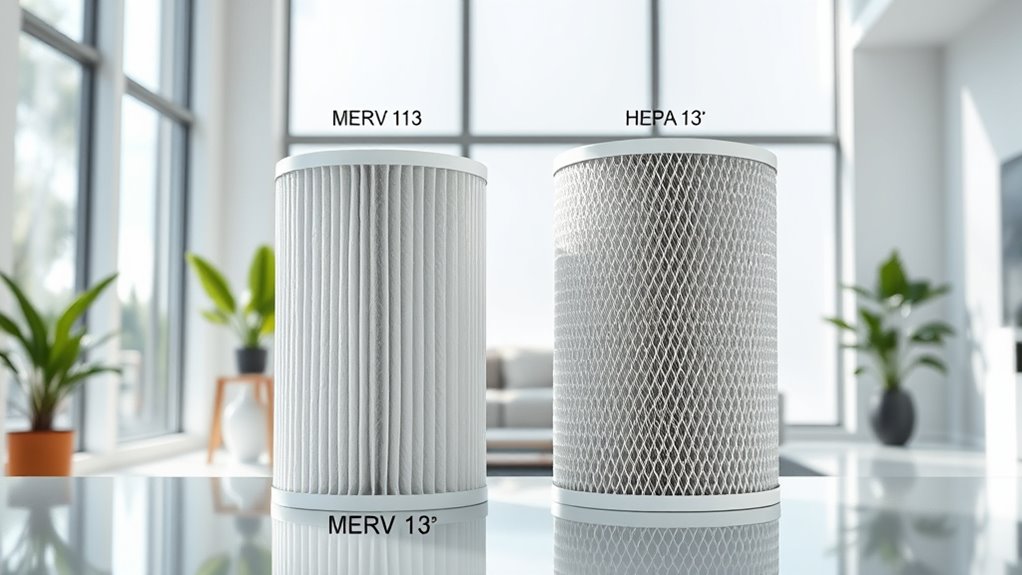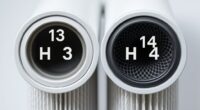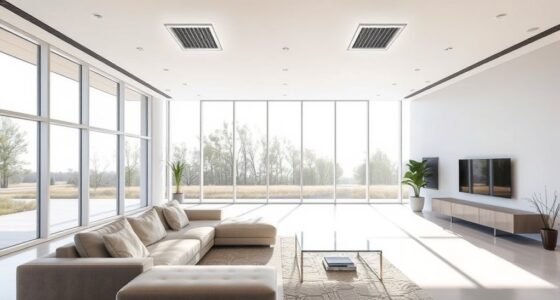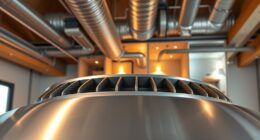MERV 13 filters effectively trap most airborne particles like dust, pollen, and mold, making them suitable for everyday home use. HEPA filters are even better, capturing 99.97% of tiny particles as small as 0.3 microns, ideal for allergy and asthma relief. While HEPA units often cost more and use more energy, MERV 13 offers a good balance of performance and affordability. To learn which works best for your home, keep exploring these options.
Key Takeaways
- HEPA filters capture 99.97% of 0.3-micron particles, ideal for allergy and asthma relief, while MERV 13 filters a broad range of airborne contaminants.
- HEPA filters are denser, more effective but require more frequent replacements and higher energy use compared to MERV 13 filters.
- MERV 13 filters balance filtration efficiency and airflow, making them suitable for everyday home use with lower costs.
- HEPA filters are best for high-pollution environments, sensitive spaces, or health concerns, whereas MERV 13 is a practical choice for general indoor air quality.
- Proper installation and maintenance are essential for both filter types to ensure maximum effectiveness and long-term savings.
Understanding MERV Ratings and Their Significance
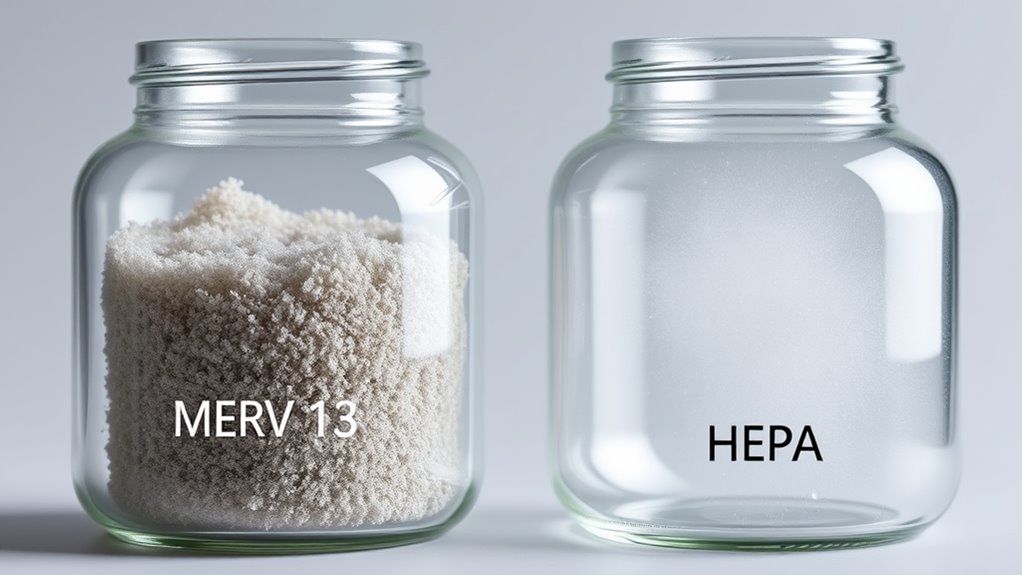
Understanding MERV ratings is essential because they indicate how well a filter can trap airborne particles. A higher MERV rating means better filtration, which directly impacts your home’s air quality. When choosing a filter, consider how long it will last; higher-rated filters often need more frequent replacements due to their dense material. MERV ratings range from 1 to 20, with MERV 13 falling into a high-efficiency category suitable for capturing smaller particles like dust, pollen, and pet dander. This balance helps improve air quality without overly restricting airflow, which can strain your HVAC system. Keep in mind that a filter’s lifespan depends on its MERV rating, your household environment, and how often you replace it. Proper selection guarantees cleaner air and maintains your system’s efficiency. Additionally, understanding mindfulness techniques can help you stay aware of your indoor air quality habits and make more informed choices for a healthier home.
How HEPA Filters Function and Their Effectiveness
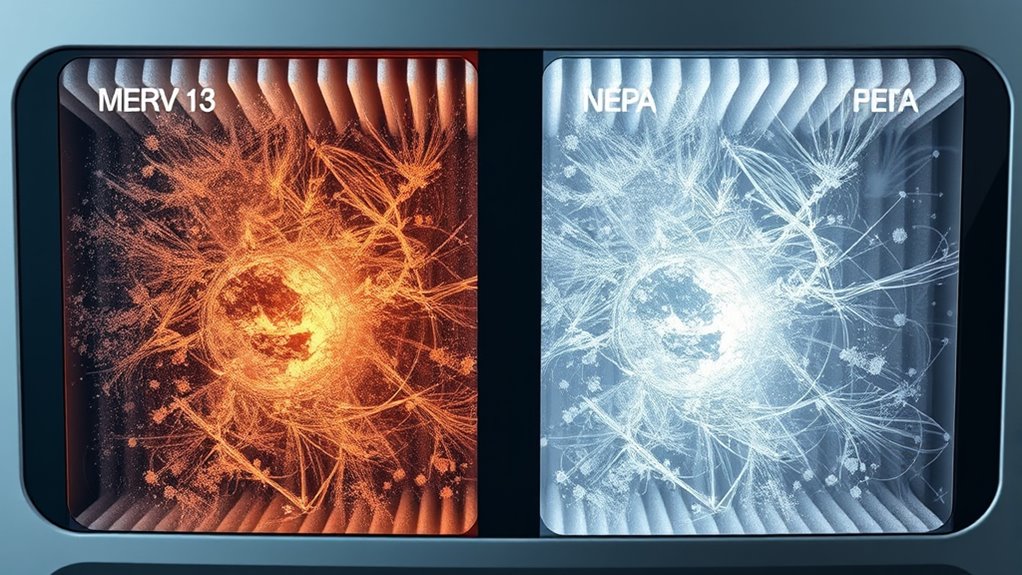
HEPA filters work by trapping airborne particles through a combination of physical and electrostatic mechanisms, making them highly effective at cleaning indoor air. To maximize their efficiency, proper filter installation is essential, ensuring an airtight seal. Additionally, airflow optimization helps maintain consistent air circulation, preventing bypass and reducing particle escape. When installed correctly, HEPA filters effectively capture dust, pollen, mold spores, and bacteria, improving air quality. Regular maintenance, including timely filter replacement, keeps these filters functioning at peak performance. Using proper filtration techniques can further enhance the overall effectiveness of your air purification system.
Comparing Filtration Capabilities: MERV 13 Vs HEPA
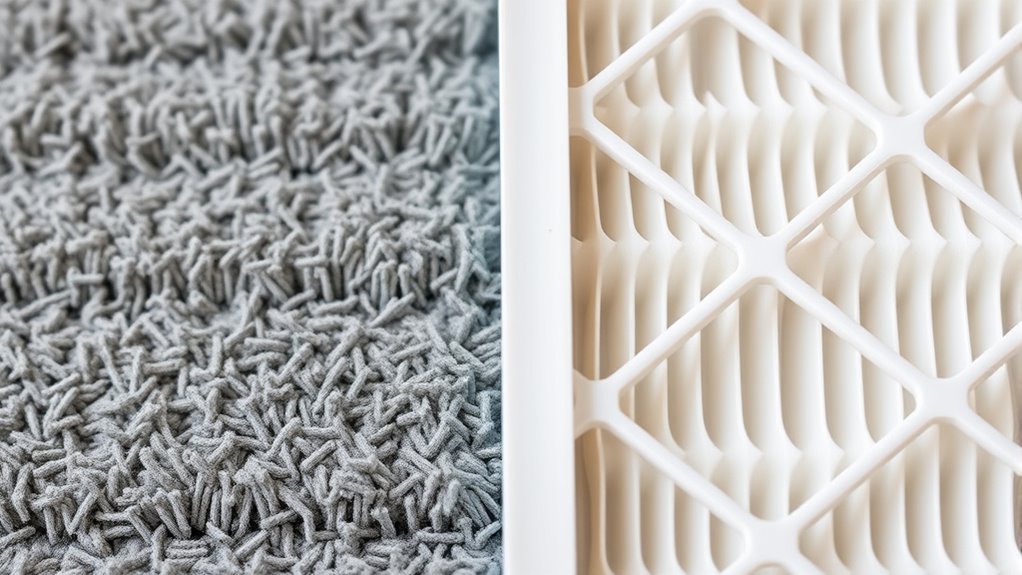
While both MERV 13 filters and HEPA filters are designed to improve indoor air quality, they differ markedly in their filtration capabilities. HEPA filters are highly efficient, capturing 99.97% of particles as small as 0.3 microns, making them ideal for thorough air purification. MERV 13 filters, though slightly less efficient, still remove a wide range of airborne contaminants, including pollen, dust, and bacteria. When comparing the two, consider their filter durability—HEPA filters often require more frequent replacement due to their dense media. Additionally, HEPA filters excel in high-grade air purification, but MERV 13 filters offer a good balance of performance and longevity. Special Occasions can sometimes call for higher filtration standards to protect vulnerable populations. Both contribute notably to cleaner, healthier indoor air.
Ideal Home Environments for MERV 13 Filters
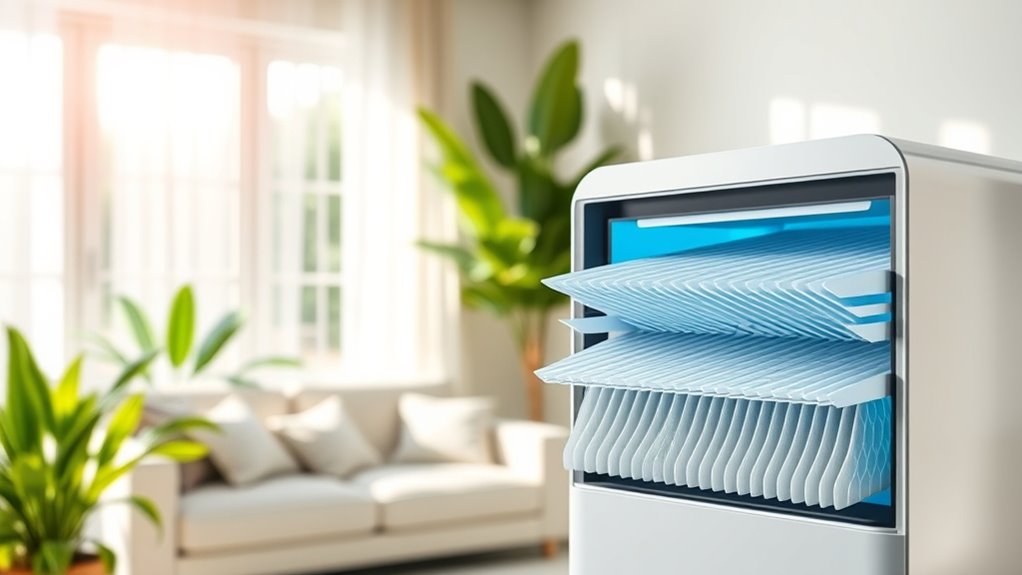
MERV 13 filters are an excellent choice for homes that prioritize good indoor air quality without the need for specialized filtration systems. They work well in environments with moderate to high levels of airborne pollutants, such as urban areas or homes with pets. To keep your air purifier performing best, regular air purifier maintenance is essential, including changing filters according to the manufacturer’s recommendations. When installing your filter, follow the filter installation tips closely—ensure it fits securely and is placed correctly for maximum efficiency. MERV 13 filters are suitable for everyday use in living rooms, bedrooms, and kitchens where you want cleaner air without the added complexity of HEPA filters. Proper maintenance and correct installation help you get the most out of your filter’s capabilities. Additionally, understanding the differences between filter types can help you choose the right filtration system for your specific needs air filtration technology.
When to Choose a HEPA Filter for Your Space
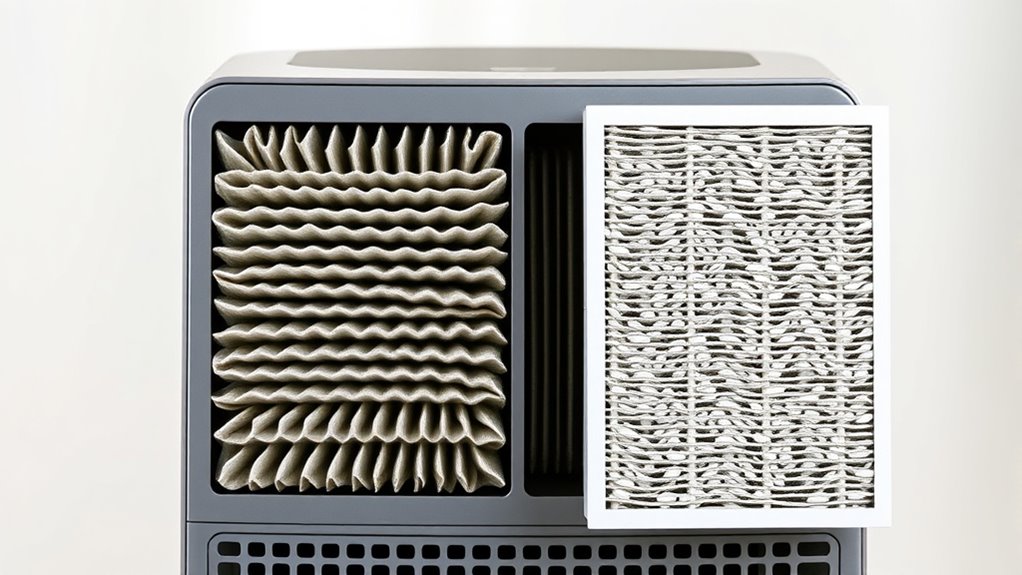
If your space has high pollution levels or requires a very clean environment, a HEPA filter might be your best choice. It’s especially important if you or your family suffer from allergies or asthma, as HEPA filters capture tiny particles that other filters miss. When precision air purification matters most, opting for a HEPA filter makes all the difference. Additionally, understanding the differences between filtration technologies, such as air purification methods, can help you select the most effective solution for your needs.
High Pollution Levels
When pollution levels in your environment spike, choosing the right air filtration becomes essential. HEPA filters excel in these situations because they capture tiny particles like allergens, bacteria, and smoke, profoundly improving air purification. If you notice persistent dust, mold spores, or pollen, a HEPA filter can help reduce these pollutants effectively. Consider the following to determine if a HEPA filter is right for you:
- Your space has high levels of airborne contaminants or odors
- You need superior filtration for allergy or asthma relief
- You want a reliable solution that requires proper filter installation for maximum efficiency
In such cases, investing in a HEPA filter ensures cleaner indoor air, providing peace of mind during periods of high pollution. Air quality improvement
Sensitive Environments Needed
Sensitive environments such as hospitals, laboratories, or nurseries require the highest level of air filtration to protect vulnerable individuals from airborne hazards. In these spaces, maintaining ideal air quality is critical, making HEPA filters the best choice due to their advanced filtration technology. HEPA filters trap 99.97% of particles as small as 0.3 microns, ensuring cleaner air. Use this table to understand the significance:
| Environment | Filtration Priority |
|---|---|
| Hospitals | Remove bacteria, viruses, and allergens |
| Laboratories | Filter chemical fumes and microbes |
| Nurseries | Protect infants from airborne pollutants |
| Cleanrooms | Maintain sterile air quality |
| Care Facilities | Minimize airborne infection risks |
When safety and air purity are paramount, choosing a HEPA filter is essential. Vetted – Grobal World
Allergy and Asthma Relief
Choosing a HEPA filter is especially important if you or someone in your space suffers from allergies or asthma. HEPA filters are highly effective at capturing airborne particles like pollen, pet dander, and dust mites, which can trigger symptoms. Proper filter installation guarantees ideal air circulation, maximizing the filter’s benefits. When considering a HEPA filter, look for models that fit your space and are easy to maintain. Regular filter replacement keeps air quality high and prevents clogging, which can hinder air circulation. If allergy or asthma symptoms persist, upgrading to a HEPA filter can make a noticeable difference in your indoor environment. Additionally, leveraging AI in Business can help optimize air quality systems through predictive maintenance and real-time monitoring, ensuring your filtration systems operate at peak performance.
Maintenance and Replacement of MERV 13 and HEPA Filters
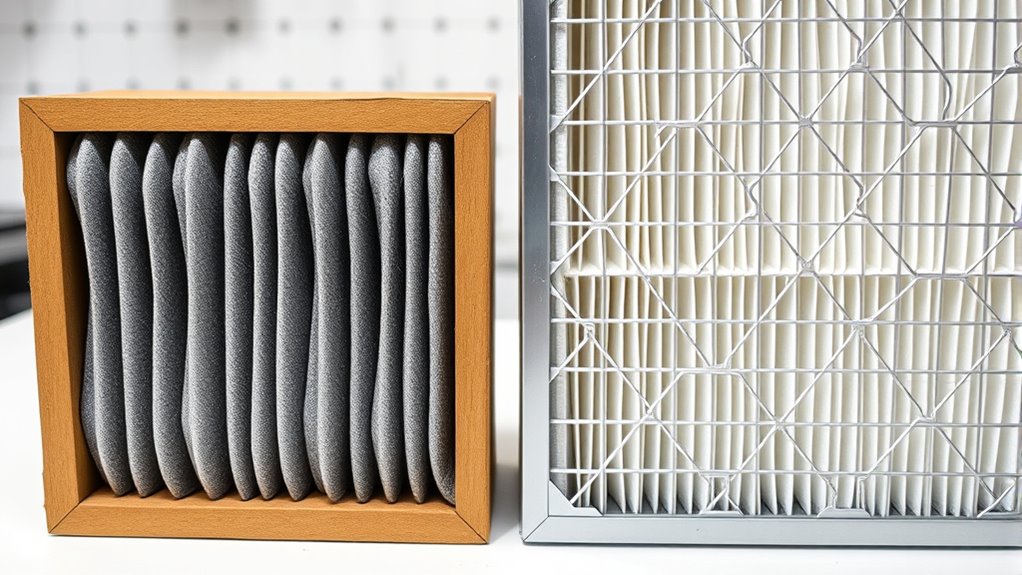
Proper maintenance and timely replacement are essential to guarantee that both MERV 13 and HEPA filters maintain peak performance. Regularly check your filters, and replace them when they become visibly dirty or according to the recommended air filter lifespan. Clean filters improve air quality and prevent strain on your HVAC system. Follow installation tips to ensure proper fit and function, which helps prolong filter life. Keep track of filter changes with reminders to avoid neglect. Additionally, ensuring the correct filter type is used can significantly impact the effectiveness of your air filtration system.
Cost Considerations and Energy Efficiency
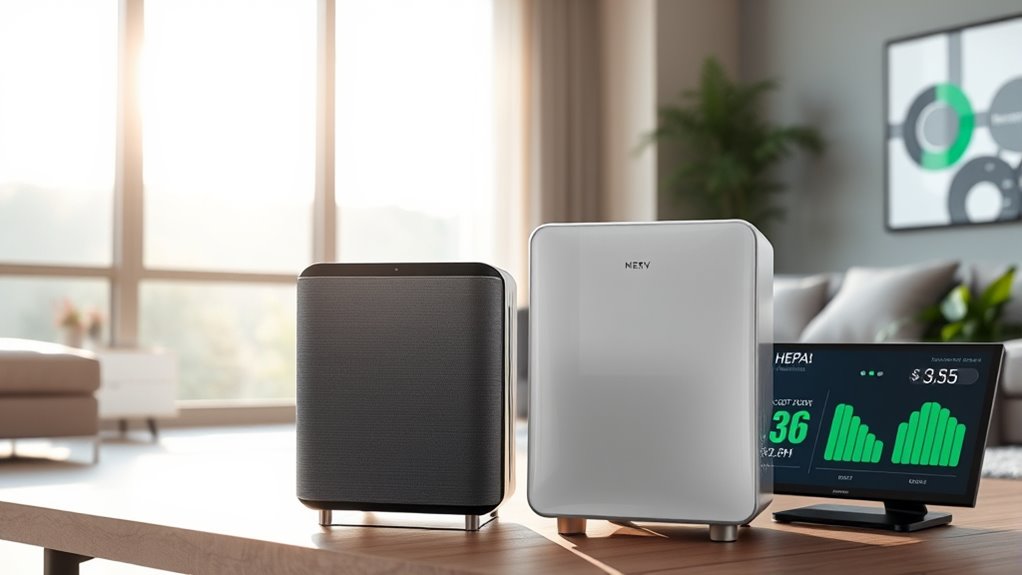
Considering the costs, HEPA filters tend to be more expensive initially than MERV 13 filters, but they may offer better long-term savings through improved air quality. Keep in mind that HEPA units often consume more energy, which can impact your monthly bills. Weighing the upfront costs against energy use and long-term benefits helps you make the most economical choice. Additionally, advancements in AI-driven solutions are beginning to influence the development of more efficient and cost-effective air filtration technologies.
Filter Cost Differences
While HEPA filters tend to be more expensive upfront, MERV 13 filters often offer a more budget-friendly option with lower initial costs. The difference mainly lies in air purifier design and filter lifespan. HEPA filters generally last longer, reducing replacement frequency and long-term expenses. MERV 13 filters, however, are more affordable initially but may need replacing more often, impacting overall costs. When comparing the two, consider:
- The initial investment versus long-term savings
- How often you’ll need to replace the filters
- The impact on your air purifier’s design and efficiency
- Filter performance can vary based on the specific needs of your indoor environment. Choosing between them depends on your budget and maintenance preferences. While HEPA filters might cost more upfront, their longer lifespan can make them more economical over time, especially if you prioritize a low-maintenance air purifier.
Energy Consumption Impact
Because HEPA filters typically require more powerful fans to push air through their dense fibers, they often consume more energy than MERV 13 filters. This increased energy use can lead to higher electricity bills over time. When choosing air purifier brands, consider models with energy-saving features or adjustable fan speeds to optimize efficiency. Proper installation tips, like sealing leaks and positioning units correctly, can improve performance and reduce unnecessary energy consumption. MERV 13 filters, while less demanding, still require adequate airflow, so selecting a compatible unit is essential. Additionally, understanding the air filtration efficiency of each system can help you balance air quality benefits against energy costs. Overall, if energy efficiency is a priority, weigh the running costs of HEPA units against MERV 13 options to find a balance between air quality and power usage.
Long-term Savings Potential
Although HEPA filters tend to consume more energy due to their dense fibers, their higher initial costs and filter longevity can impact your long-term savings. Investing in reputable air purifier brands with durable filters may cost more upfront but reduces replacement frequency and maintenance expenses. Over time, the durability of HEPA filters means fewer replacements, saving you money. MERV 13 filters, often more affordable and energy-efficient, may require more frequent changes but have lower initial costs. To maximize savings, consider the balance between filter longevity, energy consumption, and upfront expenses. Additionally, understanding filter lifespan can help you choose the most cost-effective option over time.
Making the Right Choice for Your Indoor Air Quality
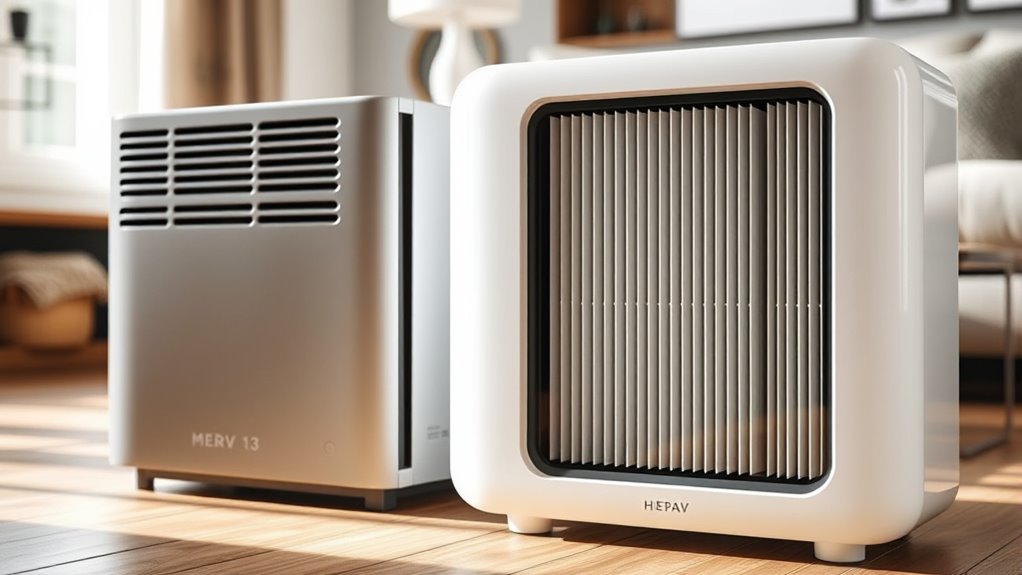
Choosing the right air filter depends on your specific indoor air quality needs and priorities. If you want an efficient Air Purifier that captures a wide range of pollutants, a HEPA filter might be your best choice due to its high filtration capability. However, consider Filter Lifespan; some filters last longer than others, which affects maintenance and replacement costs. MERV 13 filters often offer a good balance of performance and durability for everyday use, while HEPA filters excel at removing tiny particles like allergens and viruses. Think about your environment, allergies, and budget. By weighing these factors, you can select an air filter that improves your indoor air quality without unnecessary expense or hassle. Your choice should align with your health goals and lifestyle.
Frequently Asked Questions
Can MERV 13 Filters Remove Viruses Effectively?
Yes, MERV 13 filters can remove many viruses, improving your air quality markedly. They are designed for high filter efficiency, capturing particles as small as 0.3 microns, including some airborne viruses and bacteria. While not as effective as HEPA filters for virus removal, MERV 13 filters still provide strong protection by reducing the presence of harmful particles in your home air, making it safer and healthier to breathe.
Are HEPA Filters Suitable for Allergy Sufferers?
If you’re allergy sufferers, HEPA filters are ideal for improving your air quality and offering allergy relief. Imagine breathing easier during peak allergy season—HEPA filters trap tiny particles like pollen, pet dander, and dust mites effectively. Many homes with allergy-prone residents see noticeable relief using HEPA filtration systems, making them a smart choice for enhanced comfort and cleaner indoor air.
How Do MERV 13 Filters Impact HVAC System Performance?
You’ll notice that MERV 13 filters can slightly reduce airflow efficiency in your HVAC system, especially if it’s not designed for high-efficiency filters. This may cause your system to work harder, potentially impacting filter lifespan. However, if your system is compatible, MERV 13 filters effectively trap airborne particles, improving air quality without considerably compromising performance. Regular maintenance helps guarantee ideal airflow and extends filter lifespan.
What Are the Environmental Impacts of HEPA Filter Disposal?
Think of HEPA filters as delicate treasures that face recycling challenges, often ending up as toxic waste. When you dispose of them improperly, they contribute to environmental harm due to trapped pollutants and unbreakable fibers. Responsible disposal, including recycling programs, helps reduce toxic waste and minimizes environmental impacts. You can make a difference by choosing eco-friendly disposal methods, ensuring that these filters don’t become a burden on our planet.
Can MERV 13 and HEPA Filters Be Used Together Safely?
Yes, you can use MERV 13 and HEPA filters together safely if you guarantee filter compatibility and follow proper maintenance requirements. Place the MERV 13 filter upstream to trap larger particles, then use the HEPA filter downstream for capturing fine pollutants. Regularly check and replace each filter as recommended to maintain air quality and system efficiency, preventing strain on your HVAC system.
Conclusion
Choosing between MERV 13 and HEPA filters depends on your air quality needs. For example, if you’re allergy-prone and want the cleanest air possible, a HEPA filter can trap tiny particles like pollen and bacteria. However, for everyday use in most homes, a MERV 13 offers excellent filtration without the higher costs and energy use. Consider your environment and needs to find the perfect balance for fresh, healthy indoor air.
